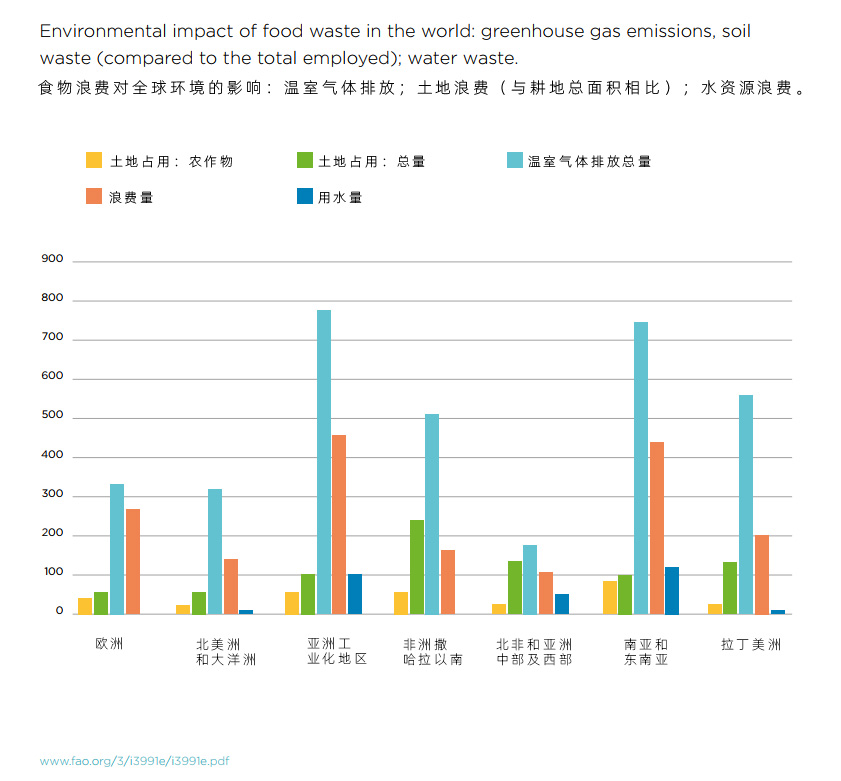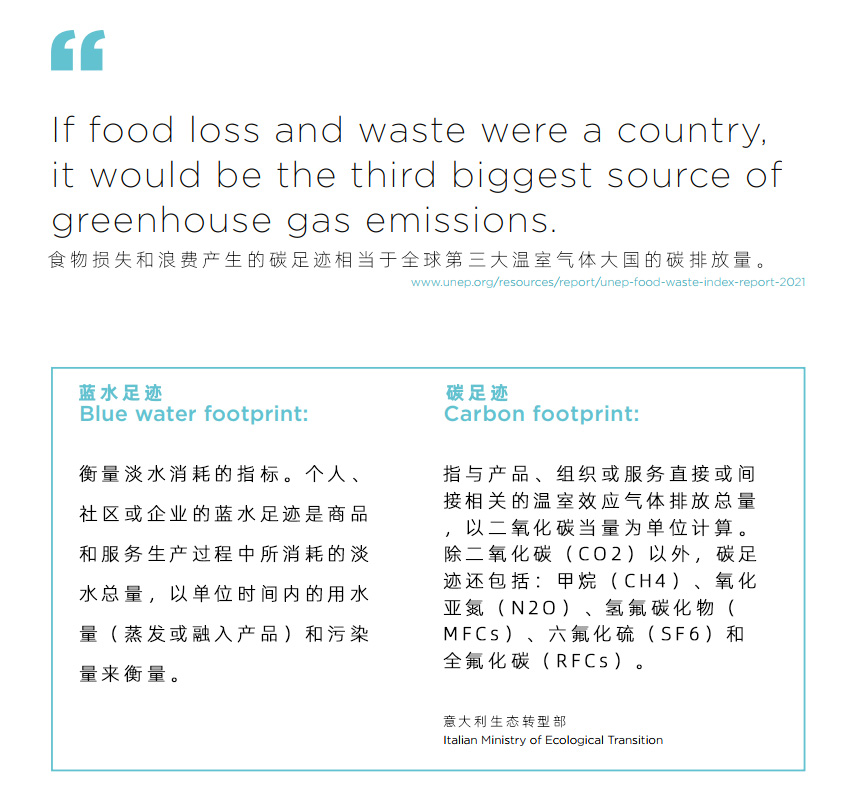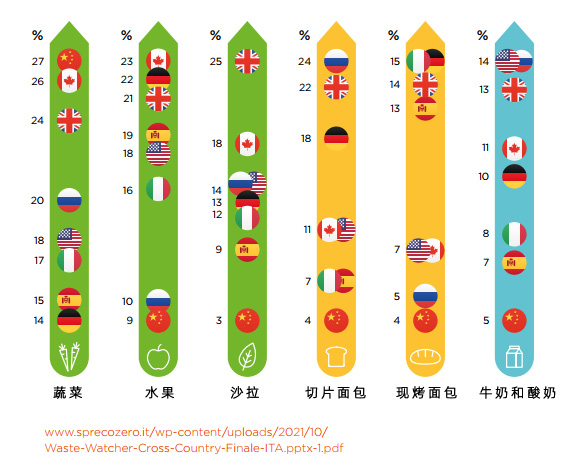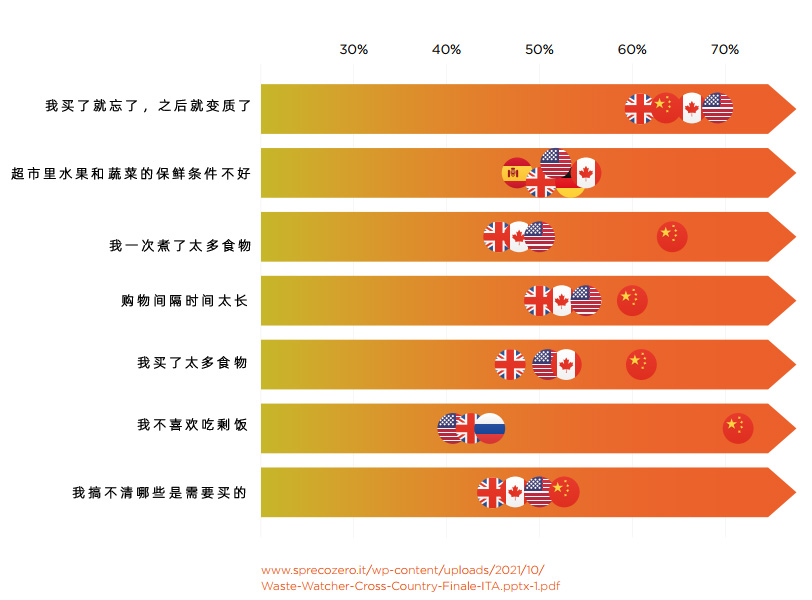Food waste causes greenhouse gas emissions and uses non-renewable resources. Around the world, the causes are shared across borders.
食物浪费会增加温室气体排放,消耗不可再生资源。保护地球环境,人人有责。
The “FAO food wastage footprint impacts on natural resources’’ estimates that the global volume of food waste amounts to around 1.6 Gtons (1 Gton = a million tons), “of equivalent primary products”, while the edible part is 1.3 Gtons, out of an agricultural production of GGtons. According to this estimate the carbon footprint of food produced and not eaten is 3.3 Gtons of CO2 equivalent; if this was a country it would be third on the podium as a source of gas emissions, after the United States and China.
联合国粮食及农业组织发布的报告《食物浪费足迹对自然资源的影响》显示,以“初级产品当量”计算,全球食物浪费量约为16亿吨“初级产品”,其中可食用部分为13亿吨,换算成最初粮食产量约为60亿吨。根据以上数值,食物浪费的碳足迹相当于33亿吨二氧化碳;如果这一排放来自某个国家,那么这个国家便是全球第三大碳排放大国,仅次于美国和中国。
Things are no better on the ’blue’ podium. Globally, the water footprint - the consumption of surface and underground water resources - linked to food waste is around 250km³. a volume equivalent to three Lake Genevas. Regarding the land, the volume of food wasted in various ways needlessly takes up 1.4 billion hectares of soil, or almost 30% of the global agricultural area.
无独有偶,在全球范围内,食物浪费的水足迹——地表和地下水的消耗量——约为250立方千米,相当于三个日内瓦湖的体积。而对于土地资源方面,由各种不必要的原因造成的食物浪费占用了14亿公顷的土地,几乎占全球农业面积的30%。
Food waste also negatively affects biodiversity, causing damage that is difficult to quantify. Certainly intensive farming, monocultures and the increasing agricultural exploitation of the soil are impacting natural and uncontaminated areas, with negative consequences for ecosystems. For all these reasons, food waste is associated with climate change.
食物浪费也会对生物多样性产生负面影响,造成难以量化的破坏。集约农业、单一种植和农业对土地的持续开采,必定会殃及原生态、未受污染的地区并危害生态系统。由此可见,食物浪费与气候变化息息相关。
The economic impact is no less shocking. The Barilla Foundation (Non sprechiamo! Let’s stop waste!), reports: food waste equals 2,600 billion US dollars a year, calculated thus: 1,000 billion for the value of lost products; the environmental costs of greenhouse gas emissions, loss of soil, water and biodiversity are valued at 700 billion; while the social costs linked to lack of food, such as damage to health and risk of conflict are estimated to be 900 billion. Last but not least, looking ahead, reducing food waste would decrease the pressure on agri-food production in anticipation of the increased demand which, it is estimated, will be needed to feed the global population in 2050.
食物浪费的经济影响也不容小觑。据百味来(Barilla)基金会(杜绝浪费,从我做起!)统计,每年浪费掉的的食物约合26000亿美元,具体计算如下:产品损失共计10000亿美元;由温室气体排放、水和土壤、生物多样性损失产生的环境成本共计7000亿美元;因食物匮乏造成的社会成本,例如健康问题、社会冲突,共计9000亿美元。预计到2050年,为供养全球人口,食物需求量会有所上升。因此从长远来看,减少食物浪费可以缓解农业食品的生产压力。


THE TREND OF FOOD WASTE IN THE HOME
家庭食物浪费趋势
The first global survey of domestic waste is the Waste Watcher International Observatory on Food & Sustainability study, under the direction of Andrea Segre Professor of Agricultural Policy, International University of Bologna. Italy.Waste Watcher国际观测站开展的“食品与可持续发展”研究是首个关于家庭浪费的全球性调查,由意大利博洛尼亚大学的农业政策教授Andrea Segre主导。
The International Cross Country Waste Watcher report sketches a picture of current global food habits.
Waste Watcher发布的《全球食物浪费调研报告》勾勒出了全球饮食习惯的现状。
The survey took place in eight countries on a statistical sample of 8,000 people with 1,000 interviews per country.
该调研涉及八个国家,在每个国家的统计样本为8000人、访谈量为1000次。
What do we waste most?
我们最常浪费的是什么?
All around the world, fresh and perishable foods - fruit, vegetables, dairy - are those which are most frequently wasted. Fruit and vegetables most specifically, with a weekly percentage of 42.6 grams of fruit per person in the USA, to 24.5 per person in Russia. Another ‘big waste’ is fresh bread: the USA is ahead again, with 38.3 grams, followed by the English with 33.8 grams, and Italy with 22.3 grams a week.
在世界各地,新鲜易腐的食物——水果、蔬菜、乳制品——是最容易被浪费的。尤其是水果和蔬菜,在美国,平均每人每周浪费42.6克水果,在俄罗斯,这一数据是24.5克。另一个浪费“重灾区”是新鲜面包:美国再次位列榜首,平均每人每周浪费38.3克;其次是英国,为33.8克;第三是意大利,为22.3克。


Why do we waste?
我们浪费的原因是什么?
In families around the world, waste occurs for similar reasons: on average, 44% let food go out of date; 40% buy more than they need; and around 33% wrongly cook more than required. Of those interviewed, it is mainly the Chinese who let food go out of date (64%), buy too much food (61%), or cook too much (64%), while 72% say they do not like to use leftovers. Forgetting about the food they have bought is another bad habit that affects people in all the countries surveyed: one in two of the Italians. Spanish and Germans interviewed confessed to this, while the Canadians and British are even worse, respectively ‘guilty’ in 65% and 61% of cases.
在世界各地的家庭中,造成浪费的原因大抵相似:平均而言,44%的家庭是因为食物存放过久导致过期;40%的家庭是因为购买的食物过多;33%的家庭是因为煮了太多吃不完。在访谈中,大部分中国消费者表示会因为食物存放过久而过期(64%),购买食物过多(61%),或一次烹饪太多食物(64%)而造成浪费。同时有72%的中国消费者表示不喜欢吃剩饭。在调研的所有国家中,人们普遍有一个坏习惯,即买了就忘:平均来看,一半的意大利受访者表示会忘记买过的食物。西班牙和德国的受访者也表示会有这种情况;加拿大和英国更是重灾区,分别有65%和61%的人表示“记性不好”。
版权归奥马冰箱所有,转载请注明出处。





























